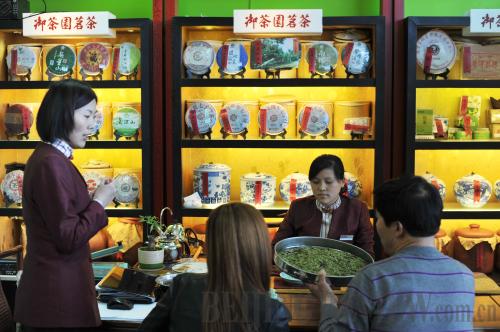|
 |
|
TEA BUSINESS: Two customers inquire about newly arrived green tea at a shop in Beijing on April 11 (WEI YAO) |
Every spring, Chinese indulge in drinking copious amounts of fresh green tea picked and processed in the country's southern mountain areas. In particular, several days before and after the Tomb Sweeping Day (April 4), tea trees blessed with faintly scented buds and tender leaves at Longjing in Hangzhou, capital of Zhejiang Province, is regarded as one of the finest green teas in China.
Tea, as well as coffee and cocoa, are the world's three major non-alcoholic drinks. As the most popular drink in China, tea has a very long history and deep cultural tradition. In China, a popular proverb reads, "Rather go without salt for three days than without tea for a single one." In both ancient and modern times, drinking tea has formed an important part of daily life. In East Asian countries in particular, it is regarded as a graceful social activity.
Along with high-speed growth of the Chinese economy since the 1990s, tea culture has yet again come to the fore, with demand ever increasing and teahouses sprouting across the country.
Today, tea is widely planted in China with several hundreds of varieties. Tea is mainly divided into seven major categories including green, black, oolong, scented, white, yellow and dark green. People drink different teas in different seasons. Generally speaking, people usually drink scented tea in spring, green tea in summer, dark green tea in autumn and black tea in winter, in order to help the drinker adapt to changes in the weather.
Since time immemorial, tea has been a daily necessity in China, and drinking it a lifestyle preserved over centuries. It has maintained its popularity in China mainly because of its health benefits. For example, in summer, green tea seems to dispel the heat and increases feelings of relaxation, while in winter, black tea helps warm the stomach and mitigates cold weather. It is particularly good for elderly people to regularly drink tea. For this reason, tea-houses can be seen in towns and cities across the country, providing elderly retirees with a spot to meet and chat over several cups.
When the Chinese first discovered wild tea shrubs 2,000 years ago, tea leaves were mainly used as herbal medicine. Today, according to medical research, tea contains a number of chemicals, of which 20 to 30 percent is tannic acid, known for its anti-inflammatory and germicidal properties. It also contains an alkaloid (5 percent, mainly caffeine), a stimulant for the nerve center and the process of metabolism. The aromatics in tea may also help digesting meat and fat. The drink is also rich in various vitamins and, for smokers, helps to discharge nicotine from the lungs.
Despite the many benefits, there are several rules to tea drinking. For instance, people should not drink tea before meals because it could stimulate an empty stomach and not before sleep because of its caffeine content. Drinking of over-strong tea may also induce heart and blood-pressure disorders. Do not drink tea steeped overnight, as its chemicals could harm the stomach. Last but not least, never drink tea water to help swallow medicine as it could adversely impact the effect of drugs.
|
